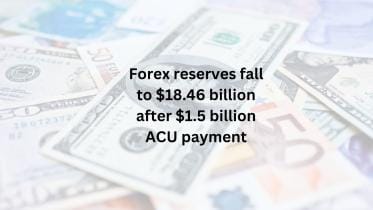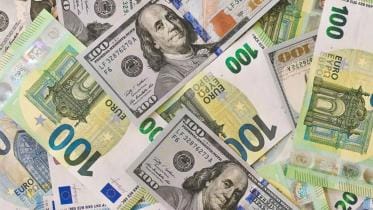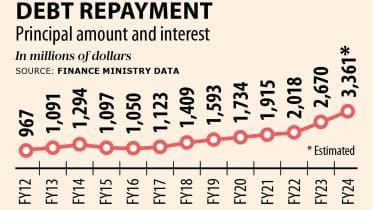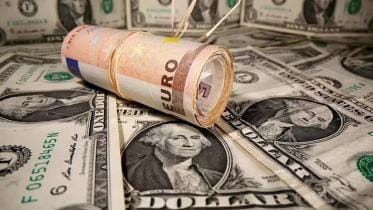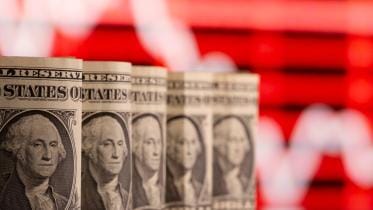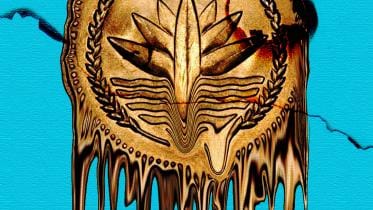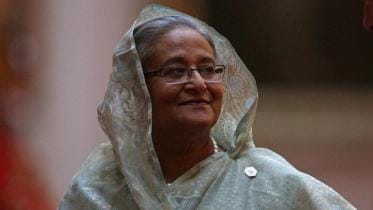foreign currency reserves
Bangladesh’s forex reserves highest since August 2023
The country now has $22.24 billion in foreign exchange, equal to four months' import bills
24 June 2025, 16:28 PM
Forex reserves cross $21b again
Bangladesh's foreign exchange reserves crossed $21 billion yesterday after almost 10 months thanks to an increased inflow of foreign currency generated by remittances and export earnings.
13 April 2025, 18:01 PM
Reserves drop below $20b after ACU payment
After remaining above the $20 billion mark for just three days, Bangladesh's foreign currency reserves dropped to $18.46 billion after the country paid its regional import bills on October 9.
12 November 2024, 20:20 PM
Forex reserves decline by $1.3 billion in a month
Reserves stood at $20.48 billion on July 31, down from $21.78 billion a month ago
1 August 2024, 12:37 PM
Forex reserves rise by $300 million in a week
Reserves hit $19.53 billion on June 19, up from $19.21 billion on June 12
20 June 2024, 11:15 AM
Budget For Fy25: 53pc rise in allocation for debt servicing
The government’s allocation to repay foreign debts may reach Tk 57,000 crore in the next budget, a 53 percent rise from the current year, putting further pressure on the country’s dwindling foreign currency reserves.
25 May 2024, 18:00 PM
‘Bangladesh robbed of $14b in 3 years’
Says PM’s Energy Adviser Tawfiq-e-Elahi Chowdhury on global oil price hike
24 March 2024, 18:00 PM
BB introduces counter-trade to ease forex pressure
The Bangladesh Bank has unveiled the counter-trade policy, an arrangement that promotes direct exchanges of goods and services without cash, with a view to reducing pressure on dwindling foreign currency reserves.
11 March 2024, 00:19 AM
A bleak time to draw up budget
In June last year when Finance Minister AHM Mustafa Kamal placed the budget in parliament, inflation had already been creeping up and the foreign currency reserves were on the decline. These two had derailed the full economic recovery from a two-year crisis wrought by the Covid pandemic.
31 May 2023, 01:00 AM
Forex reserves slip below $30 billion for second time in May
It hit $29.97 billion on May 24
25 May 2023, 15:47 PM
Lessons learned from disruptions caused by Covid-19, war
The business sector in Bangladesh has been going through severe challenges for the past four years, which, for many, have been the toughest period in decades, with the coronavirus pandemic being the dominant factor in the early part before the Russia-Ukraine war broke out. Today, we are running the last report of a series and it focuses on the lessons for the businesses from the two unprecedented shocks.
18 April 2023, 02:30 AM
Come June, reserves will hit $37.7b
The government is expecting the shrinking foreign currency reserves will buck the trend and hit $37.7 billion by June thanks to lower imports and budget support from development partners.
30 January 2023, 01:20 AM
Phones, laptops, internet turned pricier in 2022
Bangladesh’s steady embrace of digitalisation, spearheaded by a growing number of tech startups and rising software and IT service exports, has suffered a heavy blow from the imposition of new taxes this year.
27 December 2022, 02:30 AM
Only two options left for macroeconomic stability
Bangladesh does not have too many policy options other than reducing consumption of goods and services and making the exchange rate flexible in order to ensure macroeconomic stability, said a central bank report.
22 December 2022, 02:00 AM
What does the IMF loan mean for Bangladesh?
This fiscal year alone, the Bangladesh Bank has supplied more than $4.5 billion to the market to support the exchange rate, while the import bill averages $6 billion a month.
10 November 2022, 02:56 AM
When currency, not arms, is the weapon of choice
The use of money for good and bad has a long history.
12 October 2022, 02:00 AM
Bangladesh’s currency conundrum: What role can interest rates play?
Bangladesh Bank can better fix the currency turmoil by freeing both interest rate and exchange rate to adjust over time.
24 September 2022, 14:00 PM
Forex pressure may ease by Dec but inflation to stay
The record fuel price hike last week has thrown a spanner in the works to the finance division’s projection of bringing the twin problems of inflation and delicate foreign currency reserves under control by December.
11 August 2022, 02:00 AM
IMF stands ready to help Bangladesh
The International Monetary Fund yesterday conveyed its interest to support Bangladesh with its request for loan to prop up its strained foreign currency reserves.
4 August 2022, 02:30 AM
“Have enough forex reserves to import food for 6-9 months”
Prime Minister Sheikh Hasina today (July 27, 2022) said Bangladesh would be able to meet six to nine months of import expenditures with the existing foreign currency reserves.
27 July 2022, 09:27 AM




